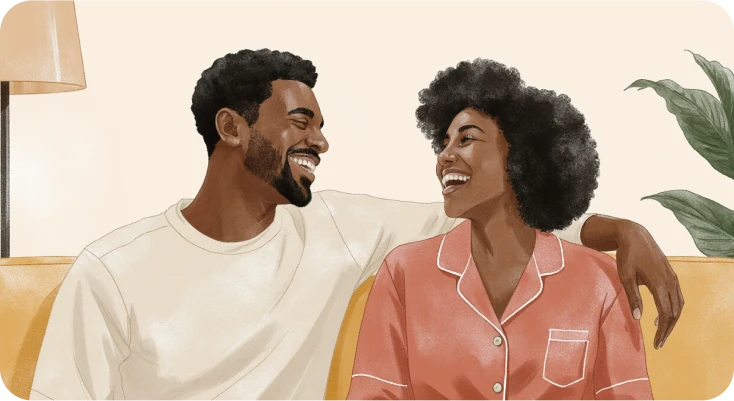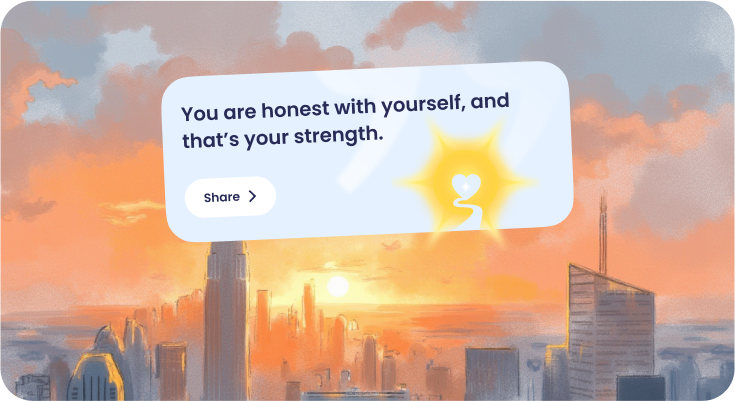The friend zone is a phenomenon in the psychology of relationships where one person sets limits on the friendship level, while the other experiences romantic or sexual attraction. As a complex emotional situation, the friend zone may cause misunderstanding and conflicts.
Let’s find out if it’s possible how to get out of the friend zone and get psychology-backed expert advice on how to change the “just friends” situation.
But first, let’s try to understand our own emotional patterns. Take the free Attachment Test to see how well you handle rejection and build deeper connections.
Is It Always Possible To Get Out of the Friend Zone?
Statistics show that 98% of people have experienced being in a friend zone in their lives [1]. The good news? According to another study, about two-thirds of romantic relationships begin as friendships, sometimes lasting for months or even years [2]. Moreover, survey shows that many people also call their spouses and romantic partners their best friends [3].
So, being in the friend zone doesn’t mean the end of your chances. With time, mutual understanding, and emotional connection, friendship can naturally evolve into lasting romantic relationships.
However, before trying to get out of the friend zone and take your relationship to the next level, accept this truth: you can’t make someone like you. What you can do is to focus on authentic self-growth and healthy connection, while respecting the other person’s autonomy, or choose to walk away if it’s not mutual.
Expert Insight
People often develop romantic feelings in close friendships because emotional intimacy and shared experiences can foster attraction. However, attraction is not always mutual, as individuals may differ in how they perceive a relationship. Social psychology shows that proximity, similarity, and emotional bonding increase the likelihood of attraction, but this does not guarantee reciprocity.
Makaela Bamonti
Mental health professional
What To Do When You’re Stuck in the Friend Zone: 6 Steps
Here are six practical steps to help you handle the friend zone with confidence and clarity:
1. Get to Know the Person And Analyze What Exactly Attracts You
Perhaps you fell in love with someone who is very confident, while you are a shy person. Or they are a pro in the field that inspires you, and you want to gain some skills.
Ask yourself if you may have fallen for an idealized version of them rather than the real person. Spend time together, try to find out more about their core values, interests, experiences, and opinions.
2. Focus on Self-Improvement
Follow your interests, increase your self-esteem, and gain a sense of independence. When you learn how to love yourself more and become the best version of yourself, you may naturally develop an attractive lifestyle, making the other person see you in a new light. Small changes in how you act, talk, and connect emotionally can open the door to something more than friendship and let them see sides of you they may not have noticed before.
Here are ideas on how to change your life:
Pursue your passions
Make time for hobbies that excite you. If you’re interested in personal growth, you may attend a workshop on mindfulness activities, communication skills, or financial planning. Or, you may join a running club. Or maybe you’ve always wanted to start your own music band? Now’s the time to make that idea a reality. Passion is attractive because it shows purpose and enthusiasm.
Notice when your thoughts are making you doubt reality
Sometimes, a person may hope they can get out of the friend zone if they make the other person jealous or criticize those their friend likes. Or they think that at the beginning of the relationship, they should have been more persistent, and then they wouldn’t have ended up in the friend zone. These thoughts are a form of doubting reality. Try to avoid them, as they won’t help you change the situation or feel better, only keeping you fixated on the painful “what ifs.”

Meet new people instead of fixating on one person
If you’re always there at their beck and call, you can come across as too safe or predictable. Try to stop being overly available to create some healthy distance. You can suggest spending some time apart from this person you are just friends with, and looking for new opportunities to expand your social circle and acquaintances.
How long has it been since you talked to someone other than your crush? When was the last time you got together with your friends to play board games or have a movie night? Don’t put all your eggs in one basket and be open to new opportunities, friendships, and romantic relationships with other people. Meeting new supportive people and making friends as an adult can inspire change and transform your life. As an idea, you can try the following places to meet people who share your values:
- Professional networking events
- Your friends’ gatherings
- Community classes or special interest workshops
- Weekend camping, short retreats, or group tours
- Volunteering
Boost your confidence
Work on your posture, eye contact, and body language. As confidence grows through action, step outside your comfort zone regularly. For example, learn some strategies on how to talk to anyone and try to use them in daily social situations:
- Compliment people sincerely, focusing on their skills and achievements.
- Ask open-ended questions like “What do you think about…?” to keep the dialogue flowing.
- Practice small talk with strangers, like chatting with a barista, shop assistant, or colleague.
- Match and mirror other people’s body language, tone, and energy level to feel more in control while having a conversation.
- Remember names and address people by name to make them feel more connected and valued.
If you wonder how to work on yourself, the Breeze app can help you set up a goal and track your progress. For instance, you can create a goal like “Make six new acquaintances within a month” to train your social skills and mark off each goal as you go.

3. Show Romantic Interest
One of the common reasons people find themselves in a friend zone is that they over-invest emotionally without expressing attraction. To get out of the friend zone, try to create the right environment for romantic and sexual attraction:
Spend more one-on-one time
Sometimes, group hangouts can reinforce “friend zone” vibes. That’s why you can invite your potential romantic partner to something slightly more intimate, like checking out a new rooftop bar or going on a weekend hike.
Build closeness respectfully, step by step
Physical closeness can strengthen emotional connection, but it’s important to be respectful and pay attention to their comfort. Start with small, natural physical contact that feel casual and friendly, and observe how they respond. The goal isn’t to rush intimacy but to create small moments of closeness that can slowly build a sense of connection and attraction while always respecting your potential partner’s boundaries.
If they lean in, it’s a positive sign; if they pull back, respect the boundary. If you’re afraid of overstepping, you may start practicing consensual gestures in everyday moments. Touch can be part of normal interactions, like a high-five, a side-hug, or a supportive pat on the shoulder.
Looking for more ways to understand yourself and your romantic relationships? The Breeze app offers a variety of quizzes:
- Your attachment style to understand how you form emotional bonds.
- Childhood trauma and how it affects your relationships in adult life.
- Your values and temperament help you understand what drives your behavior.
- How likable you are and many more.
We offer you to start with an emotional intelligence test. Why? A person with low emotional intelligence may have difficulty determining the emotional state of other people and rarely notice the changes in their mood. That’s why you may learn more about your strengths and get insights on what makes you unique to get out of the friend zone.
4. Be Honest About Your Feelings
Another reason why people stay in a friend zone is that they hide their romantic intentions for too long. Eventually, you’ll need to communicate how you feel. Otherwise, you risk staying stuck in a friend zone.
Keep it simple and confident like “I’ve really enjoyed spending time with you, and I feel like there might be something more here. I’d regret not being honest about it.”
Looking for tools to boost your self-esteem and become more confident in your relationships? Breeze personalized daily affirmations can help you:
- Strengthen your self-worth and belief in yourself.
- Reduce self-doubt and negative thoughts, like “Why am I so insecure?” that hold you back.
- Build confidence in social situations and the dating world.
- Get motivated and focused on personal growth every day.

5. Respect Their Answer
When you decide that you are ready to move to the next level of intimacy to get out of the friend zone, you need to accept that this may lead to possible rejection or a change in the friendship.
The emotional side of this process can be difficult, and it is important to prepare yourself for how your romantic partner might react.
There is also a level of vulnerability that comes with being in a relationship. The risk of rejection can affect your sense of self and confidence. This requires a deep understanding of your own emotions and skills for managing emotional responses or stress reactions.
If they say yes, that’s great. Take things slow and let the relationship grow naturally. If they say no:
- Don’t beg, negotiate, or guilt-trip.
- Accept their feelings respectfully.
- Decide whether you want to maintain the friendship or create distance to protect your emotions, and understand how to get out of your head.
6. Take Care of Yourself
After experiencing rejection or changes in a relationship with a loved one, you may feel worthless. That’s why the first thing you need is to restore your self-esteem and confidence:
- Realize that rejection does not define your worth as a person. Keep in mind that attraction is subjective. The right person will appreciate you for who you are.
- Accept your emotions and understand how to feel your feelings. According to research on self-compassion and mental health, understanding your emotions helps you react more thoughtfully, not impulsively, to situations in life [4]. Let yourself grieve the “what could have been” because it’s part of healing. According to research on personal growth, facing your emotions directly helps you learn from tough experiences and makes you stronger and more open in the future [5].
- Talk to friends or a mental health professional. It can help you gain perspective, feel supported and learn how to not take things personally.
- Use journaling as a healing tool. Writing down your feelings can help you process complex emotions, improve your intrapersonal skills, and get your life together. With Breeze journaling, you can reflect on your experiences, track your emotional progress, and gain insights into your patterns.

The Emotional Impact of Being in the Friend Zone
In the friend zone, the boundaries of the relationship can be blurred. The person experiencing romantic or sexual interest may feel hope, while their object of love can send mixed signals, feeding this feelings, often unintentionally.
When someone is stuck in the friend zone, they may constantly feel ignored or taken for granted. They care, give, and invest in the other person, but don’t receive the romantic response or sexual attraction they hope for.
As a result, a person in the friend zone can feel resentment and a decline in self-worth and confidence, while the other often struggles with guilt. This does not necessarily mean a mental health disorder, but it can be emotionally draining if boundaries are unclear or if feelings remain unresolved. Over time, this imbalance can become familiar, and the one in the friend zone perceived as “just a friend” may start to accept it as the “new normal.”
Expert Insight
Being in the “friend zone” is not inherently a mental health issue, but it can lead to feelings of rejection, frustration, or low self-esteem if unaddressed. Prolonged unreciprocated attraction may cause stress or rumination, especially if boundaries are unclear. Supportive coping strategies such as talking openly, maintaining perspective, and fostering self-worth can help prevent lasting emotional strain.
Makaela Bamonti
Mental health professional
Sources
- EBSCO. Unrequited love. 2023.
- Stinson, D. A., Cameron, J. J., & Hoplock, L. B. (2021). The Friends-to-Lovers Pathway to Romance: Prevalent, Preferred, and Overlooked by Science. July 12, 2021.
- Monmouth University. Two-thirds believe in existence of “soulmates”. February 2017.
- Lea Shania Anthes, Aljoscha Dreisörner. Self-compassion and mental health: a systematic review and transactional model on mechanisms of change. September 2024.
- Mia M. Maurer, Jason Maurer 1, Eva Hoff, Daiva Daukantaitė ScienceDirect. What is the process of personal growth? Introducing the Personal Growth Process Model. August 2023.
Disclaimer
This article is for general informative and self-discovery purposes only. It should not replace expert guidance from professionals.
Any action you take in response to the information in this article, whether directly or indirectly, is solely your responsibility and is done at your own risk. Breeze content team and its mental health experts disclaim any liability, loss, or risk, personal, professional, or otherwise, which may result from the use and/or application of any content.
Always consult your doctor or other certified health practitioner with any medical questions or concerns
Breeze articles exclusively cite trusted sources, such as academic research institutions and medical associations, including research and studies from PubMed, ResearchGate, or similar databases. Examine our subject-matter editors and editorial process to see how we verify facts and maintain the accuracy, reliability, and trustworthiness of our material.
Was this article helpful?





